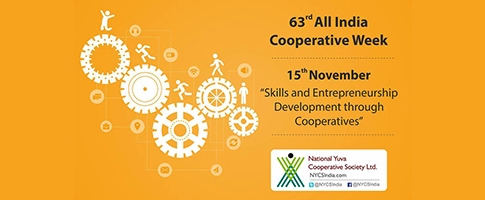Skills And Entrepreneurship Development Through Cooperatives
Skills And Entrepreneurship Development Through Cooperatives

What Is Skill and Entrepreneurship Development?
According to American psychologist Carl Rogers "Skill Development involves the stretching and growing of becoming more and more of one's potentialities. It involves the courage to be. It means launching oneself fully into the stream of life". Alternatively, in simple words Skills development is the process of identifying your goals, analysing the skill gaps, and then developing and honing these skills. It is important because your skills determine your ability to execute your plans with success. With required skills and knowledge a person can start and run his own enterprise. Skill Development most of the times thus unsurprisingly leads to entrepreneurship development.
Skills and Entrepreneurship Development In India
As much as the country is developing, it still faces the youth employment crisis. A considerable number of young people are neither in employment nor in education and training. This "decent work deficit" not only puts the youth at risk but poses threat for the society at large too. Young people face specific challenges in entering the work force. Lack of experience can put them in the "experience trap" of unemployment. The mismatch in demand of industry and supply of labour affects the nation's informal economy.
Skills and knowledge are the driving forces of economic growth and social development for any country. India currently faces a severe shortage of well-trained, skilled workers. Only 2 to 3 percent of the workforce currently has undergone formal skill training. Large sections of the educated workforce have little or no job skills, making them largely unemployable. Therefore, India must focus on scaling up skill training efforts to meet the demands of employers and drive economic growth.
In India, skill training involves diverse stakeholders such as multiple government departments at the centre and state levels, industrial and educational training partners, assessment partners and certification partners apart from the people who actually need the training. All these stakeholders need to work together in order to compete and complete the “National Skill Devlopment Mission”.
Skill India Mission
The Ministry of Skill Development and Entrepreneurship was set in November 2014 to drive the ‘Skill India’ mission with speed. The mission statement asserts “To rapidly scale up skill development efforts in India, by creating an end-to-end, outcome-focused implementation framework, which aligns demands of the employers for a well-trained skilled workforce with aspirations of Indian citizens for sustainable livelihoods.”
The Mission consists of a Governing Council at apex level, a Steering Committee and a Mission Directorate supported by National Skill Development Agency(NSDA), National Skill DevelopmentCorporation(NSDC), and Directorate General Of Training(DGT) all under the umbrella of the Ministry of Skill Development and Entrepreneurship.
Role Of Cooperatives In Skill Development And Entrepreneurship
Cooperatives are principle based enterprises that put people rather than profit at the centre of their business. Democratic nature of cooperatives encourages participation and foster youth empowerment. In line with their principle of education and training, many a cooperatives are actively working towards promoting skill development and entrepreneurship amongst youth. Cooperatives attract youth to create their own enterprises or create potential employees whom they will offer decent work. Now that cooperatives are operative in various areas of the economy such as credit, production, processing, marketing, input distribution, housing, dairying, textiles, dairy, poultry, fishery, housing, sugar and handlooms, the cooperatives have achieved good success and provide a good ground for skill development in diverse fields.
Cooperatives can use their large membership network to reach out to the community and making them aware about the government initiatives. Members of cooperatives too need to upgrade their skills with changing times and can avail various courses under the Skill India Mission. Cooperatives can share their knowledge and inputs in developing the standard curriculum needed for the skill development in their areas of work. Cooperatives can themselves become training providers and get affiliated with sector skill councils and get their training centres accredited and encourage the youth to enrol for such skill development courses.
NYCS’s Slice In Skill Development And Entrepreneurship
NYCS strongly believes in youth empowerment through skill development and entrepreneurship and in association with National Skill Development Corporation (NSDC) as a training partner runs many such courses under Pradhan Mantri Kaushal Vikas Yojana (PMKVY) to make the youth employable and lead a respectful life.
NYCS’s Kovida division (Knowledge Of Vocational Insight Development Academy) is pledged to give a skillfull India to the world and focuses on Campus entrepreneurship, women entrepreneurship, Techno entrepreneurship, Agri entrepreneurship, Artisan entrepreneurship. Kovida in Sanskrit means skills and facilitates self employment and entrepreneurship through skilling youth and other stakeholders. It aims to create an entire value chain starting from skill development training to incubation and placement assistance to linkages with financial institution, hand holding and mentoring support.
NYCS has recently launched the Kaushalya Setu project with the Maharashtra Government to bring the less successful SSC students or dropouts into the economic flow by polishing their employability skills and entrepreneurship possibilities.
NYCS celebrated the 63rd All India Cooperative Week between 14th to 20th November. The date of 15th November had a theme dedicated to the skill development and entrepreneurship through cooperatives. We believe in doing our bit towards the Skill India mission and contribute in the nations development.

